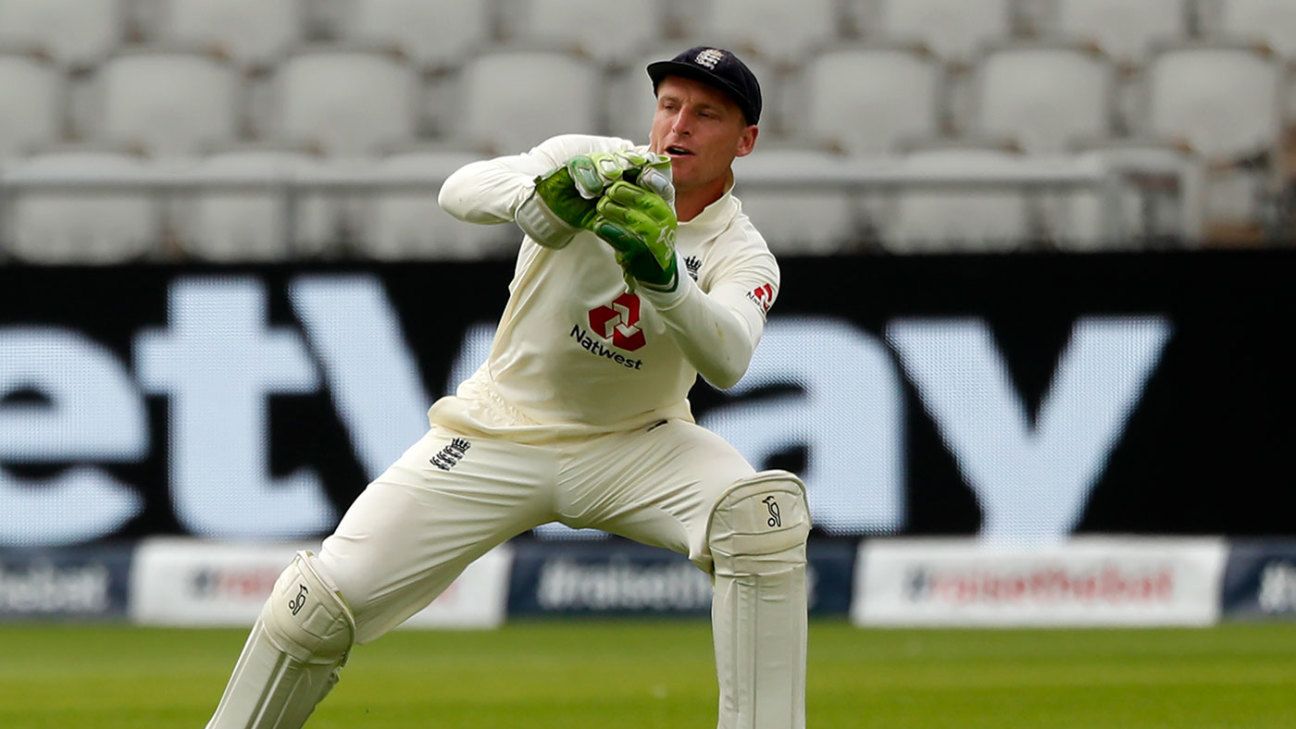
Whatever Jos Buttler achieves in the remainder of his playing career, his place in the folklore of English cricket is secure.
Already established as perhaps the best white-ball batsman his country has ever produced, he kept his nerve under considerable pressure to complete the run out that secured victory in the World Cup final. There may have been better moments in the history of English cricket, but it's not especially easy to remember them.
His subsequent decision to auction the shirt he was wearing when he completed the run-out underlined the impression he is, very much, one of the good guys. The proceeds were donated to help the NHS.
So, you can understand why the England management want him around. He is a selfless presence, a calm voice, a talented player and, potentially, a destructive batsman.
ALSO READ: Buttler still 'vital' insists Root as pressure mounts
But there are serious questions to ask about him as a Test cricketer. Now playing his 45th Test, he has one century to his name and averages 31.63.
While that might not sound too bad, it needs to be seen in the context of the 17 Tests - including the current one - he has played since the start of 2019. In those, he has averaged 24.46 with four half-centuries. Two of those came in a dead rubber in St Lucia; one other came when the Ashes had been conceded at The Oval. His 67 against West Indies a couple of weeks ago was his first half-century in eight Tests. He desperately needs - and England desperately need him - to convert his start in England's first innings into a substantial contribution.
Whether he does or not, there must be doubts over his continuing role as keeper. He missed three chances during Pakistan's first innings of the series. And if two of the chances were relatively demanding, the third was as regulation as can be expected. He also fluffed a run-out chance when his throw to the bowlers' end looped comically wide.
They were costly errors. The first two - a dropped catch and a missed stumping - reprieved Shan Masood when he had 45. He eventually made 156.
To be fair to Buttler, his keeping has been generally sound since he reclaimed the gloves at the end of last year. He didn't drop any chances in the four Tests he played in South Africa or the one he played in New Zealand.
But he did drop one in Southampton and it was costly. Jermaine Blackwood, on 20, gloved a chance down the leg side but Buttler was unable to cling on. Blackwood went on to make 95 that ensured a West Indies victory.
Was it a tough chance? Well, keepers whose footwork is better tend to make chances appear easier. It wasn't easy, but this is Test cricket and a generation ago, when keepers were picked primarily for their ability to catch rather than their ability to make runs, it would have been considered regulation.
Spare a thought for Dom Bess, too. As if it wasn't hard enough trying to pursue as a career as an international spinner when you are 22 years old and far from certain of a place in your county side, Bess is also failing to gain the support he should be able to expect from his keeper. All three of the chances Buttler missed were off his bowling. He finished with 1 for 74; he deserved considerably better.
"Dom Bess is failing to gain the support he should be able to expect from his keeper. He finished with 1 for 74 but deserved better"
The worry for England is they are scheduled to play seven Tests in Asia - two in Sri Lanka and five in either India or the UAE - this winter. That means they require a keeper who is proficient standing up to the spinners. On this evidence, they do not have one in Buttler. He's yet to complete a stumping in his Test career.
It's not as if England are struggling for alternatives, either. In Ben Foakes, England have an excellent keeper who has already shown in his brief international career that he has the talent and temperament to contribute more with the bat. He made a century on Test debut and claimed the player-of-the-match award in his only ODI. Within a day of keeping at Test level, he had completed more stumpings than Buttler.
None of this should be a surprise, really. Going into this match, Buttler had played 109 first-class games and averaged 32.06. That is not a small sample size. He wasn't first-choice keeper at Somerset and there's considerable doubt whether he would be at Lancashire. It is unrealistic and probably unreasonable to expect him to go up a level and perform better.
ALSO READ: Stubborn Smith staking reputation on Buttler's Test career
But he is Ed Smith's signature selection. For when Buttler was recalled in May 2018, Smith made it very clear that it was on his personal insistence. There certainly wasn't much statistical evidence to support it: Buttler hadn't played a first-class match in eight months and hadn't made a first-class century in the best part of four years.
It worked for a while. In the next 10 Tests, Buttler averaged 44.70, registered his maiden century and added six half-centuries. It may be relevant that he kept wicket in only one of those games. In a low-scoring series in Sri Lanka, he was particularly influential.
But the start of 2019 is a long time ago. Buttler has benefitted from more patience and more chances than most. Whatever he contributes off the pitch, he has not contributed the runs required or the dismissals expected on it. Yet Smith and co. appear reluctant - some would say stubbornly reluctant - to accept their hunch was wrong.
The other concern for England is that, at some stage, Buttler's red-ball disappointments might seep into his white-ball cricket. In the shorter formats he is such an irrepressible, confident figure and he's so integral to England's hopes of becoming the first men's team to hold both T20 and 50-over World Cups simultaneously. Here, though, he looked weary, disappointed, and bereft of confidence.
At some stage, the England management might need to cut him free in Test cricket so as not to spoil him as a limited-overs player. He is, without doubt, a brilliant international cricketer. It's just there's increasing evidence to suggest he's not a brilliant Test cricketer.















 Phone: (800) 737. 6040
Phone: (800) 737. 6040 Fax: (800) 825 5558
Fax: (800) 825 5558 Website:
Website:  Email:
Email: 






